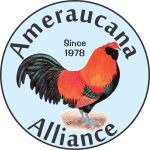Well, I'll throw a quick two-cents in the pot. I have a little bit different take. Now keep my comments in the context that I love my hobby and I've put more time, effort, and money into it than I can possibly even imagined - or want to! Especially the money part!! And I truly believe the 10yrs I've been breeding and showing has produced measurable and qualitative improvement. But when I boil it all down to its purest form it's still just a hobby. They're still just a bunch of birds.
The last couple of years everyone was all in a tizzy, some in a bona fide panic, over the Avian Flu. All that was being talked about on every poultry site was Bird Flu and Biosecurity.
Well, I'll probably take a bunch of flack for this but I never sweated it for a nanosecond. I have two ponds on my place. My upper coop is about 100yds from the southern bigger pond and my lower coop is about 30yrds from it. I also have ducks and Pilgrim geese. AND I feed about half the North American flock of mallards every Fall and Winter. Seriously, during the Winter it's not unusual at all for me to flush a 100 or more mallards off the ponds when I make my rounds. I also get other kinds of ducks. So for me to exercise real Biosecurity I would have to completely revamp my whole way of having birds.
Moreover, to do that I'd have to revamp my whole thinking on my I have birds. One of the greatest joys I get is to just watch my birds out and about. Roaming as they please and carrying on with their various antics. I have been to places where all there birds where contained in either pet carriers lines up in a row and stacked on each other or closed up in pens and I can honestly say if I had to do that I'd give up the birds, stop breeding, and stop showing.
So I settled in my mind that if I got the Bird Flu and had to have all my birds put down I'd take that as a sign from the Lord that it was time to move on to another hobby. Wouldn't break my heart if I got to go fishing and hunting again. Besides that I've been saving up emails I get from Digital Photography School and might even be able to learn how to use my 7D that I bought a few years ago.
Now, mind ya, I do practice a modicum of reasonable precautionary measures. I haven't brought a bird on my place in years. When I have folks come over to buy birds I make sure they're not in their farm clothes and if they're wearing boots or such I have a mat that I pure chlorine on. I don't vaccinate or medicate for anything except Amprolium for Cocci and Piperazine-17 for worms. It's pretty rare that I even see a sick bird anymore and, on the rare occasion that I due, I wring it's neck and throw it over the fence for the coyotes.
Personally, I seriously doubt whether ILT, Mareks, or any other disease is gonna be totally eliminated. Oh, it might be as I don't recall the last time I heard of anyone getting Polio but that hasn't stopped a new disease from popping up. For us older folks, when did you ever hear of a baby being born with defects due to the Zika virus?? I'd pretty much bet the farm that if ILT were eradicated, and ceased to exist, something else would come along and take it's place.
So I can fret over it and make more work for myself over what might happen or I can just not worry about it at all and enjoy things one day at a time while I can. Personally, I'm gonna do the latter.
 Welcome to the Ameraucana Forum!
Welcome to the Ameraucana Forum!

